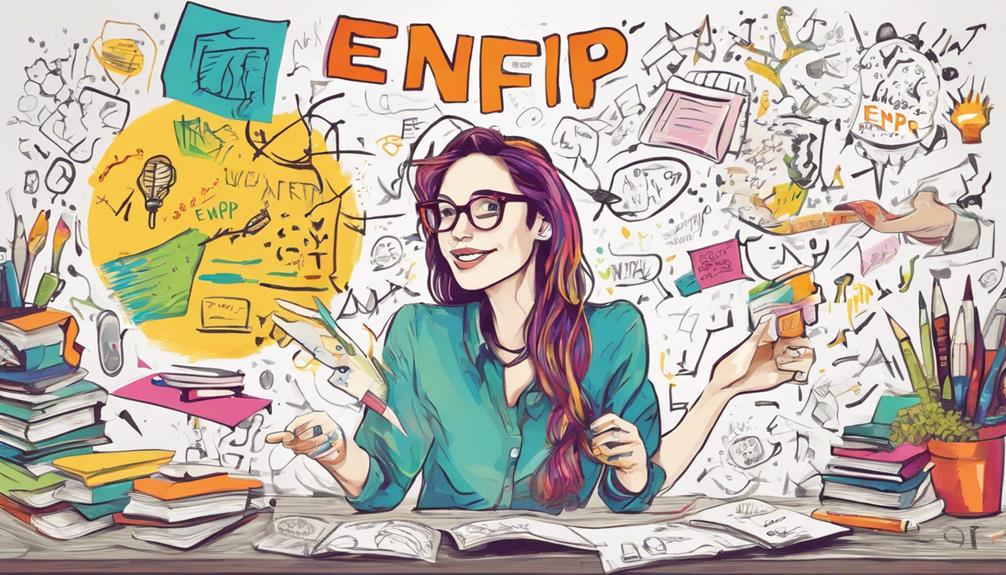When examining the relationship between an INTJ and an ESFP, it’s captivating to observe that these personality types do not have any cognitive functions in common, presenting their interaction as an intriguing exploration of differences.
The way they approach decision-making, social interactions, and problem-solving can initially seem worlds apart. However, beneath the surface lies a potential for a deeply enriching and harmonious relationship.
By exploring how their differing strengths and weaknesses can complement each other, we uncover a path towards mutual growth and understanding that could surprise even the most skeptical observer.
Key Takeaways
- INTJs provide stability and long-term planning, while ESFPs inject fun and excitement.
- Balancing intellectual stimulation with present-focused conversations is essential for understanding.
- Conflict resolution involves understanding perspectives and active listening for growth.
- Building trust requires consistency, open communication, vulnerability, and honoring commitments.
Compatibility Between INTJ and ESFP
How do the complementary strengths and weaknesses of INTJs and ESFPs contribute to growth and balance in their relationship? Understanding the unique personality traits of INTJs and ESFPs is essential for fostering a harmonious relationship. While INTJs are known for their analytical and strategic thinking, ESFPs bring spontaneity and enthusiasm to the mix. These differences can create a dynamic where the INTJ provides stability and long-term planning, while the ESFP injects fun and excitement into the relationship.
In terms of emotional connections, ESFPs excel at expressing their feelings openly, which can help INTJs, who may struggle with emotional communication. This emotional depth can lead to a deeper bond between the two personalities. However, challenges may arise when it comes to communication styles and social preferences. INTJs prefer solitude and deep conversations, while ESFPs thrive in social settings. Finding a compromise between alone time and social activities is crucial for maintaining balance in the relationship. By recognizing and appreciating each other's strengths and weaknesses, INTJs and ESFPs can create a strong and fulfilling partnership.
Communication Styles in the Relationship

To navigate the intricacies of communication styles in an INTJ-ESFP relationship, understanding and adapting to each other's preferences is key for fostering mutual understanding and connection.
- Intellectual Stimulation vs. Present-Focused Conversations: INTJs prioritize intellectual stimulation and theory-based discussions, while ESFPs focus on fun, present-focused conversations and concrete communication styles.
- Meeting Halfway for Understanding: Both INTJs and ESFPs can learn to meet halfway in their communication styles to enhance understanding and connection in the relationship.
- Considering Emotional Impact: INTJs should be mindful of the emotional impact of their words when communicating with ESFPs, as emotional sensitivity is crucial for ESFPs.
- Balancing Listening and Speaking: INTJs tend to default to listening in conversations with ESFPs due to the differing paces of communication styles, but finding a balance between listening and speaking is essential for effective communication.
Understanding and respecting each other's communication styles can pave the way for deeper connections and smoother interactions between INTJs and ESFPs.
Handling Conflicts and Disagreements
Navigating conflicts and disagreements in an INTJ-ESFP relationship requires a delicate balance of understanding, compromise, and empathy. Taking the time to learn about each other's perspectives and communication styles can significantly aid in conflict resolution. It's essential to understand that conflicts are a natural part of any relationship and can be opportunities for growth when handled with empathy and respect. In conflicts, the INTJ's analytical approach can complement the ESFP's empathetic nature, leading to a more comprehensive understanding of the issue at hand.
Effective communication is key to resolving conflicts; it involves active listening, expressing thoughts and feelings openly, and being receptive to feedback. Compromise plays a vital role in finding common ground and moving past disagreements. By valuing each other's viewpoints and working together towards a solution, the INTJ-ESFP couple can strengthen their bond and foster mutual growth. Embracing these principles can't only help in conflict resolution but also deepen the emotional connection between the partners.
Building Trust and Emotional Connection

In nurturing trust and fostering emotional connection in an INTJ-ESFP relationship, honoring commitments and embracing emotional openness are foundational elements that strengthen the bond between partners. When focusing on building trust and emotional connection, consider the following key aspects:
- Commitment: Demonstrating consistency and reliability in actions and words is crucial for both INTJs and ESFPs to feel secure in the relationship.
- Communication: Open and honest communication allows for the sharing of thoughts, feelings, and concerns, fostering understanding and closeness.
- Vulnerability: Being willing to show vulnerability and share emotions creates a safe space for both partners to deepen their emotional connection.
- Honoring Commitments: Following through on promises and commitments reinforces trust and shows respect for each other's needs and expectations.
Nurturing a Strong INTJ-ESFP Bond
Nurturing a strong bond between an INTJ and an ESFP requires a deep understanding of each other's unique qualities and a commitment to mutual growth and support. Building trust through honoring commitments and fostering emotional openness is fundamental.
Effective communication, compromise, and understanding play vital roles in developing a deep connection between INTJs and ESFPs. Embracing each other's strengths and differences can lead to a harmonious and fulfilling relationship dynamic. It's essential to respect each other's communication styles and preferences.
Encouraging personal growth, learning from one another, and supporting individual goals strengthen the INTJ-ESFP bond. By prioritizing mutual respect and actively working on communication and compromise, the relationship between an INTJ and an ESFP can flourish.
Openness to understanding and embracing differences is key in creating a lasting and meaningful connection between these two personality types.
Frequently Asked Questions
Do ESFP and INTJ Get Along?
Yes, ESFPs and INTJs can get along well. Our differences in communication styles may pose challenges, yet they offer growth opportunities. Learning from each other's perspectives and respecting values is vital for harmony in our relationship.
Why Are ESFPs Attracted to Intjs?
We find ESFPs attracted to INTJs for their depth of thought, logical problem-solving, and intriguing insights. The stability and unique perspectives INTJs offer provide security and balance that ESFPs appreciate, fostering a strong connection.
Are INTJ and ESFP Opposites?
Yes, INTJs and ESFPs are opposites in many ways. While INTJs are introverted and logical, ESFPs are extroverted and emotional. These differences can create a dynamic and enriching relationship if both parties embrace understanding and growth.
What Is the Most Compatible Relationship for Esfp?
We find ESFPs are most compatible with ISTJ and ISFJ types due to shared values and communication styles. Partners who appreciate spontaneity, emotional expressiveness, and prioritize emotional connection create fulfilling relationships for ESFPs.
Conclusion
In conclusion, understanding the dynamics between an INTJ and an ESFP can lead to a fulfilling and balanced relationship. Despite their differences, they can complement each other's strengths and weaknesses to create a strong emotional connection.
One interesting statistic to note is that research shows that couples with contrasting personality types often have the most growth and development in their relationships. By embracing their differences and working together, INTJs and ESFPs can cultivate a deep and meaningful bond.









